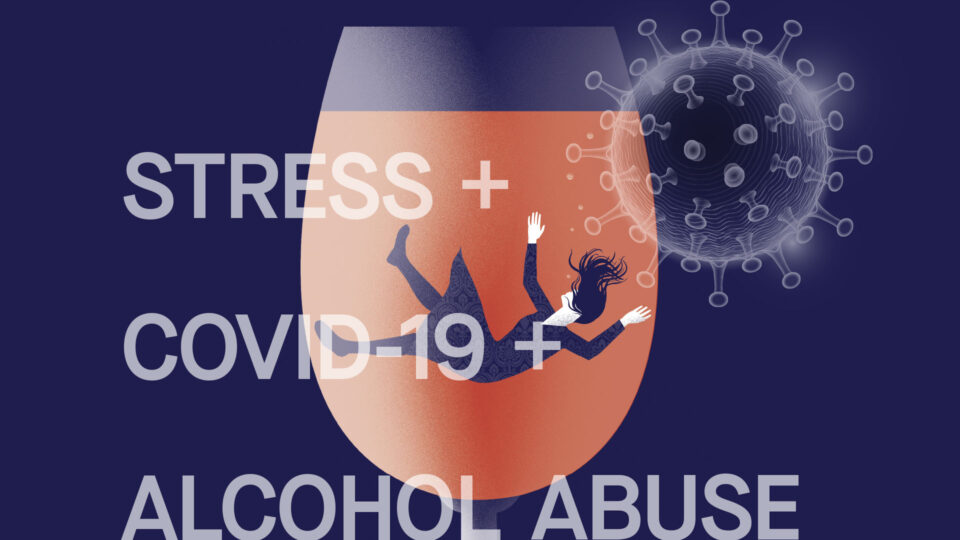
A Q&A with alcohol researcher Marisa Roberto, PhD
As the coronavirus pandemic took hold during early spring 2020 and stay-at-home orders went into effect, millions of Americans struggled with intense feelings of stress and isolation. For many, alcohol provided a respite.
But as months wore on, problematic behavior emerged. In August, the Centers for Disease Control and Prevention warned of significantly higher levels of substance abuse and mental health issues compared with the year earlier. Nonetheless, online alcohol sales surged.

“The pandemic has been emotionally overwhelming, especially when you factor in social isolation and concerns for friends and family,” says Scripps Research Professor Marisa Roberto, PhD, vice chair of Molecular Medicine, who has studied alcohol’s effect on the brain for more than two decades. “A glass of wine or a cocktail can temporarily relieve this stress, and it’s so accessible.”
But as Roberto’s research has shown, drinking alcohol as a coping strategy can make matters worse. Excessive alcohol consumption triggers changes in the brain that intensify the stress response—meaning that a person’s threshold for managing stress will fall, and alcohol cravings will emerge as the brain seeks to allay the negative feelings.
Roberto worries that as society finally reopens after more than a year of shut-downs and isolation, many people will be left with more than a bad habit. Here, she sheds light on what has become an unexpected side effect of the COVID-19 pandemic and shares promising new insights from her laboratory.
Your recent research looks at the previously unknown role immune cells play in driving alcohol abuse. What did you find?
In studies with mice, we discovered that chronic alcohol use actually reshapes the brain’s immune landscape. It causes inflammation, damaging immune cells that are needed to maintain healthy neurons. This, in turn, leads to increased feelings of anxiety and further drives the urge to drink. It’s a cycle that can be very difficult to break. The good news is that if you return to healthy habits, you can reverse most of the damage over time.
More broadly, can too much alcohol interfere with our body’s ability to fight COVID-19?
Yes, there’s much scientific evidence that excessive alcohol use suppresses the body’s immune system. This makes you more susceptible to viral or bacterial infections. It’s logical that this could contribute to a more severe manifestation of COVID-19, although that’s an ongoing area of research. We also know that excessive drinking damages cells that line the surface of the lungs and is associated with respiratory diseases, including acute respiratory distress syndrome. This, of course, has major implications for COVID-19, which is also a respiratory disease.
For the average person, how much alcohol is too much?
According to the National Institute on Alcohol Abuse and Alcoholism, heavy drinking is defined as more than four drinks per day for men and more than three drinks for women. But I always say it’s important to look at not just how much you drink, but also why and how often. Binge drinking on the weekend, for example, recruits the stress system and decreases your immune response. Moderate drinking is less than many people would expect: two drinks per day for men and just one for women.
What drew you to the science of alcohol addiction?
Initially, I took interest in alcohol’s effect on the brain because I wanted to know how it impacts memory—for example, when excessive drinking causes blackouts. The more I learned, the more curious I became.
At the same time, I was beginning to understand alcohol’s enormous cost to society, which I argue is bigger than any other drug—bigger than cancer, even. Nearly 15 million people in the United States have alcohol use disorder, and better treatments are clearly needed.
Are you optimistic that new medicines will be available to help people with alcohol use disorder?
My lab is actively working on this every day—and yes, we are hopeful. Most recently, we found a way to boost the signaling of a brain immune cell known as Interleukin 10 that becomes damaged by chronic alcohol use. The cell was able to communicate better with neurons—and, in mice, this greatly reduced anxiety-like behaviors and motivation to drink alcohol. It’s an exciting avenue we’re exploring as a potential therapy. In separate rodent studies, we found encouraging results by administering oxytocin, a hormone naturally produced in the brain. Especially given all that we’re learning now about genetic predispositions, I believe we’ll have more effective and targeted treatments in the near future.
Knowing what you know, do you ever enjoy a glass of wine or a cocktail?
I am from Italy, where my family has a farm and produces wine. But I have never been interested in drinking it! I just don’t like the taste of alcohol—it tastes bitter to me. As a non-drinker, I’ve always been shocked by how much people drink. I suppose that gives me a unique vantage point as a researcher.
For people who are trying to scale back their drinking or stop altogether, what are healthier options for dealing with uncertainty surrounding COVID-19?
Remember that alcohol abuse is very much driven by overactive stress responses in the brain—that’s why scientists refer to it as a “stress surfeit disorder.” It’s important to find healthy ways to manage stress: get enough sleep, exercise, meditate, talk to a friend. I like to eat a piece of chocolate when I’m feeling stressed. For people who need extra support, many tools exist online today; therapists and addiction programs have adapted to the times. The National Institute on Alcohol Abuse and Alcoholism offers many resources on its website, www.niaaa.nih.gov.